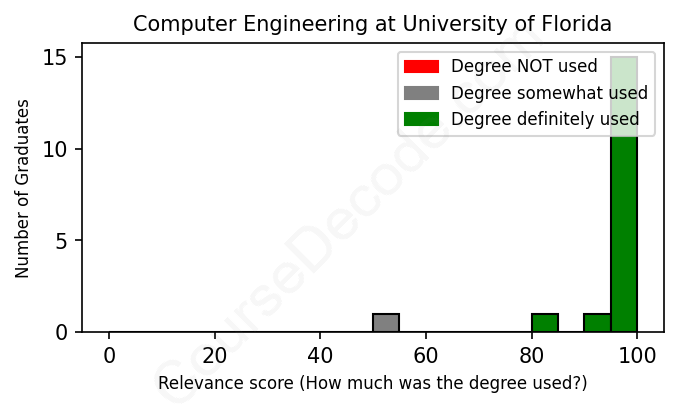
First, some facts. Of the Computer Engineering graduates from University of Florida we've analyzed , here's how many have used (or NOT used) their degree in their career:

These are estimates based on AI analysis of 18 LinkedIn profiles (see below).
The verdict? Great! Overall, with an average relevance score of 95%, Computer Engineering graduates from University of Florida have a substantially higher likelihood (+28%) of finding work in this field compared to the average graduate across all fields:
And for comparison, here's the chart for all profiles we've looked at across all degrees.
Also, after graduating, only 33% of these graduates have pursued further education other than another Bachelor's degree (such as a Masters degree or other), compared to the average across all profiles of 35%. This suggests a Bachelors degree is enough for most Computer Engineering graduates, and it's normal to look for work straight after graduation.
See the details:
|
Relevance score: 100% We think this person has gone into a career highly relevant to their degree. We think this person has gone into a career highly relevant to their degree.
DEGREE INFOGraduated in 2010 from University of Florida with a Bachelor of Science - BS in Computer Engineering. Also pursued further education since (see below). JOB HISTORY SINCE GRADUATIONAdvanced ASIC/FPGA Engineer Honeywell Feb 2012 - Jan 2022 FPGA Engineer  Ocean Insight Jan 2022 - Present FURTHER DEGREES DONE SINCE GRADUATINGMaster of Science - MSUniversity of Florida 2010 - 2011 ABOUTNo information provided. |
The top 10 most common jobs done by the graduates we've analyzed (ranked most common to least) are:
When you look at the job history of graduates with a Computer Engineering degree from the University of Florida, the most common positions they've landed are in software engineering and development. Many of these folks have taken on roles like Software Engineer, Application Developer, or Software Development Engineer, where they're tasked with creating, maintaining, and improving software systems. These positions not only require a solid understanding of programming languages but also demand strong problem-solving skills, which are essential parts of the Computer Engineering curriculum. It's clear that these jobs are highly relevant and directly related to what they studied in college.
However, there's also a noticeable mix where some graduates ended up in roles that aren't as closely tied to Computer Engineering. For instance, jobs like Business Development Intern or Project Manager involve a lot more organizational and strategic skills rather than technical know-how. While these roles might not make full use of their engineering training, it's still possible they tap into some of the analytical thinking or tech-savvy skills developed during their studies. Overall, it looks like a large majority of these graduates are successfully utilizing their degrees in relevant fields, especially in software engineering, but there are a few outliers who have strayed into less technical paths.
Here is a visual representation of the most common words in job titles for Computer Engineering graduates (this is across all Computer Engineering graduates we've analyzed, not just those who went to University of Florida):

After graduating with a degree in Computer Engineering from the University of Florida, many graduates seem to land great jobs quickly that are closely tied to their field. For instance, a good number of them jump into software engineering roles right after graduation, working at reputable companies like Harris Corporation, Lockheed Martin, and Microsoft. It looks like these first jobs are often focused on software development or other tech-centric roles, which is a solid start that aligns with their degrees. Even those who ventured into a bit more specialized areas, like FPGA engineering or technology architecture, still maintain a connection to their Computer Engineering roots.
Fast forward five to ten years, and many of these graduates are moving up the ladder in the tech world, taking on roles like DevOps Engineer, Senior Associate Engineer, and even positions at major companies like Amazon Web Services and Nvidia. The trend shows that most people are sticking to careers related to tech and engineering, which is pretty reassuring if you’re considering this degree. While a few have branched off into roles like project management or business development, they generally still retain a strong focus on tech. So, if you're thinking about a career in Computer Engineering, it seems like there's a good shot at finding fulfilling work in the field right after graduation and continuing to grow from there!
Getting a Bachelor’s degree in Computer Engineering, like the one at the University of Florida, can be pretty challenging, but it's definitely manageable if you stay on top of your game! You'll be diving into a mix of electrical engineering and computer science, which means you’ll be dealing with everything from circuits to coding. The workload can get heavy, especially during exam periods and project deadlines, so being organized and developing good study habits is key. While some students find it easier than other engineering disciplines, it's still tougher than many other majors because you need to grasp complex concepts and apply them. Just keep your motivation high and don’t hesitate to ask for help when you need it, and you’ll likely find a way to make it through successfully!
Most commonly, in the LinkedIn profiles we've looked at, it takes people 4 years to finish a Bachelor degree in Computer Engineering.
Looking at the job history of these Computer Engineering graduates from the University of Florida, it definitely seems like they've landed pretty decent gigs! Many of them are working at well-known companies like Honeywell, Harris Corporation, and even tech giants like Microsoft and Amazon. The salaries for these roles in tech generally start strong, especially for software engineers and specialized engineers, so it's safe to say that they’re likely making good money compared to the average graduate—definitely enough to support a comfortable lifestyle, especially in their early careers. Overall, it seems like they've hit the jackpot job-wise!
Here is a visual representation of the most common words seen in the "about" section of LinkedIn profiles who have a Bachelor degree in Computer Engineering (this is across all Computer Engineering graduates we've analyzed, not just those who went to University of Florida). This may or may not be useful:

Here are all colleges offering a Bachelor degree in Computer Engineering (ordered by the average relevance score of their Computer Engineering graduates, best to worst) where we have analyzed at least 10 of their graduates:
| College | Score | Count |
|---|---|---|
 University of Florida University of Florida
|
95 | 18 |
 Michigan State University Michigan State University
|
94 | 10 |
 Brigham Young University Brigham Young University
|
94 | 10 |
 Penn State University Penn State University
|
92 | 14 |
 California Polytechnic State University-San Luis Obispo California Polytechnic State University-San Luis Obispo
|
91 | 14 |
 University of Central Florida University of Central Florida
|
90 | 14 |
 Georgia Institute of Technology Georgia Institute of Technology
|
90 | 14 |
 Purdue University Purdue University
|
86 | 34 |
 University of Illinois at Urbana-Champaign University of Illinois at Urbana-Champaign
|
86 | 30 |
 Iowa State University Iowa State University
|
86 | 25 |
 Texas A&M University Texas A&M University
|
85 | 17 |
 San Jose State University San Jose State University
|
85 | 16 |
 Clemson University Clemson University
|
85 | 14 |
 Dwarkadas J. Sanghvi College of Engineering Dwarkadas J. Sanghvi College of Engineering
|
85 | 10 |
 North Dakota State University North Dakota State University
|
84 | 12 |
 Savitribai Phule Pune University Savitribai Phule Pune University
|
83 | 25 |
 University of Mumbai University of Mumbai
|
82 | 43 |
 New Jersey Institute of Technology New Jersey Institute of Technology
|
81 | 11 |
 University of North Carolina at Charlotte University of North Carolina at Charlotte
|
79 | 11 |
 California State Polytechnic University-Pomona California State Polytechnic University-Pomona
|
76 | 11 |
 The University of Texas at Dallas The University of Texas at Dallas
|
76 | 18 |
 University of South Florida University of South Florida
|
69 | 10 |
 Gujarat Technological University, Ahmedbabd Gujarat Technological University, Ahmedbabd
|
55 | 13 |